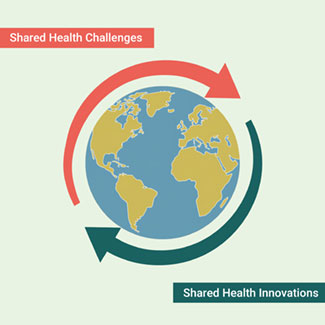Article series focuses on reciprocal innovation
July/August 2024 | Volume 23 Number 4
 Fogarty International Center
Fogarty International Center
As part of Fogarty's Center of Global Health Studies' Global Health Reciprocal Innovation project,
a series of articles has been published as a supplement in BMJ Global Health. Sponsored by Fogarty in partnership with NIH Institutes, Centers, and Offices (ICOs), the supplement highlights examples, successes, and challenges in the exchange of innovations between low/middle-income and high-income countries.
“Reciprocal Innovation," as defined by the Indiana University Center for Global Health, is the "bi-directional and iterative exchange of a technology, methodology, or process between at least two countries, one lower- or middle-income country and one high-income country, to address a common health challenge and provide mutual benefit to both sides."
The eight-article series features examples, such as
multidirectional learning between the US Ryan White HIV/AIDS Program and the US President's Emergency Plan for AIDS Relief (PEFAR). From the early days of PEPFAR, the Health Resources and Services Administration (HRSA) laid the path for transitioning PEPFAR activities from US-based organizations to sustainable, country-led entities. As global programs matured, lessons learned within LMICs gradually began strengthening health services in the U.S. One example in India was the use of psychology-trained lay counsellors for suicide prevention screenings and referrals developed in the U.S. and tailored to key populations' needs in India. Lessons learned from the adaptation of this program in India were later used for South Asian communities in the U.S.
Other articles in the series focus on
ethical, legal and regulatory considerations, for funders, sponsors, and investigators and
strategies to promote equitable bidirectional research training opportunities. Many of the authors followed up on publication with a
satellite session at AIDS2024, the the 25th International AIDS Conference, entitled Global health reciprocal innovation (GHRI): optimizing the global impact of health interventions through novel research partnerships and knowledge exchange.
More Information
Updated August 20, 2024
To view Adobe PDF files,
download current, free accessible plug-ins from Adobe's website.